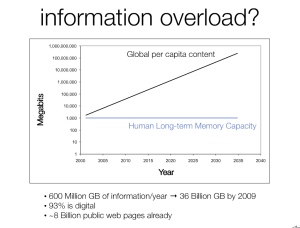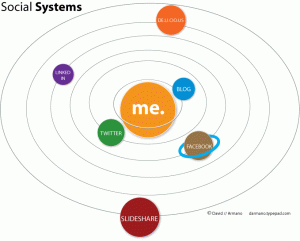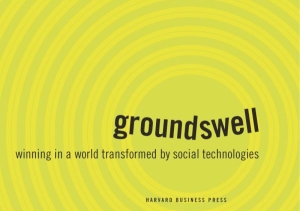There are three things I want to talk about in this post – information overload, the reality of “virtual” friends, and a new book I just picked up called groundswell by Charlene Li and Josh Bernoff of Forrester Research.
Exhibit A:
I think this graphic makes it fairly obvious that there is a lot of information out there, and not enough memory in our brains to take it all in. So what does this abundance of information mean? I found this quote from Herbert Simon (1916-2001), a cognitive psychologist on a blog after seeing it on a slideshare.net slide (same place I saw the graphic above) and googling the quote to find out more:
“What information consumes is rather obvious: it consumes the attention of its recipients. Hence a wealth of information creates a poverty of attention, and a need to allocate that attention efficiently among the overabundance of information sources that might consume it.”
So, if there is a wealth of information, a lack of attention, and not enough memory capacity to absorb it all, where does that leave us? Computer brains, of course! Not that we’ll have computers implanted in our brains, although apparently scientists are already putting brains in robots – but that’s another story altogether.
What I’m thinking is more along the lines of computer software getting more intelligent and helping people sort through the limitless vortex of information. There are tons of these already – RSS readers, search engines, sites like digg.com that allow users to vote for what they think is important information, and social networks that keep track of what your friends think is important.
Which brings me to Exhibit B:
This graphic is from a post David Armano did on social systems. Of the many “social ecosystems” we maintain, he says:
“…when we find ourselves as the supplier of light in our self-created microverse, the implications become clear. There are only so many ecosystems that we can meaningfully sustain.”
So, who are our friends online? Do we really know them? Do they know us? How far can our social orbit extend? Whitney Hess posted about “the meaning of friend” the other day on her blog, which she started thinking about after reading a post on Russ Unger’s blog. She tries to decipher the distinction between all the social networks, and what it really means to be a “friend” – on Facebook, on LinkedIn, on Twitter, etc.:
“Maybe the reality is that a “virtual friend” ceases to exist when you walk away from the computer, while real friends remain with you wherever you may be. But in the age of mobile devices, we’re communicating when I’m at work, at home, at the park, at the gym, at dinner, when I’m shopping, when I’m just waking up…you’re with me in all of these private moments, so maybe that’s why the line gets blurred.”
She follows up on her next post with places you can find me, listing the sites she is on and inviting her blog readers to add her to their networks. Proof that the online community of “friends” is still alive and kicking. I follow Whitney Hess on Twitter, btw. That’s how I found out about her posts. I don’t even remember why I started following her on twitter. Hmmm….
Whoever our “virtual friends” are, we follow them for a reason, whether we have met them in person or not. And, we’re much more likely to trust their opinion than the opinion of advertisers or companies. I just read a statistic that 61% of consumers trust people like themselves over advertisers – but in the plethora of sites I’ve been looking at lately, of course I can’t remember where I saw it. Will have to dig into that later. Maybe my friends out there can help me out on this statistic?
Update: bendy3008 pointed out that the Edelman report, which he mentions in his post, has the 61% stat. Thanks!
And finally – Exhibit C:
Very hypnotic cover – and, I just noticed, very similar to David Armano’s graphic above. I’ve skimmed through this book, and so far, I think it gives some good examples of different types of “social technographics” as they call them – which include creators, critics, collectors, joiners, spectators, and inactives.
groundswell, btw, as defined by the authors, is: “a social trend in which people use technologies to get the things they need from each other, rather than from traditional institutions like corporations.” It’s all about the masses of people being bigger as a collective whole through social communities on the internet than any corporation.
So what does all this mean for the next-generation of consumers? I think it will be finding a way to aggregate all of the information down to bite-sized bits, and relying on a collective mass of human memory capacity to be able to tackle all of the information out there, i.e. our communities of “friends”, and to keep us in touch with the latest trends and news. We’re more connected now than ever before, and it gives us the opportunity to build off one another and create things that no one person alone could imagine.



That 60% trusting people like me comes from the Edelman Trust Barometer.
See! I knew it – go power of the social network!
Thanks so much for including me in your post. I’m glad you’re getting use out of the blog. Keep reading. I’d love to get your comments sometime!